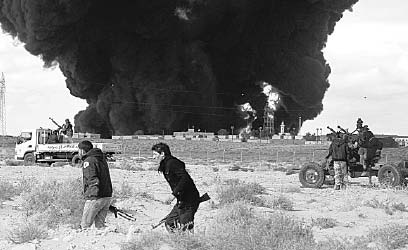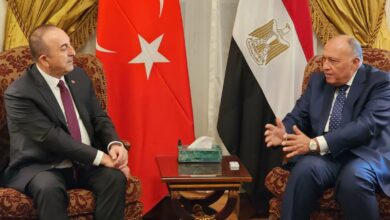
With the Libyan government still incapable of ensuring national security, the question of when it will disband the Interior Ministry’s Supreme Security Committee (SSC) has stirred controversy.
The SSC was first created by the National Transitional Council (NTC) after the fall of former President Muammar Qadhafi, and then expanded by former Interior Minister Fawzi Abdelal. Some 140,000 men were accepted into its ranks. Its supporters championed the committee as an immediate way to bring militias under state control.
Libya’s new Interior Minister Ashour Shuwail, who took over from Abdelal in December, says he intends to disband the SSC, and had initially planned to do so by the end of December. SSC members wanting to continue working in Libya’s internal security sector would be folded into the Interior Ministry in order to consolidate all security forces under one umbrella.
But concerns about a potential security vacuum and how best to integrate SSC members into the new Interior Ministry have made recently appointed Prime Minister Ali Zeidan rethink the initial deadline.
“[The SSC] will continue for a while,” he recently told the daily independent newspaper Libya Herald.
A new Interior Ministry has replaced the Qadhafi-era Internal Security forces, and the Defense Ministry is attempting to create a functional national military to replace Qadhafi’s system of regional militias led by his sons. The development of these state forces will take time.
SSC leaders say the committee should not disband at all.
“That will put Libya in big trouble,” says Adel Rjub, the Tripoli-based acting director of the committee. “SSC is maintaining control in Libya.”
The country currently faces continued attacks on security facilities in Benghazi, incidents of crime and violence between civilians, and intermittent flare-ups of political violence in places like Beni Walid. However, much of Libya is relatively safe in terms of regional post-conflict situations.
Referring to the current insecurity in Benghazi, Rjub said: “The police force is inactive. Policemen can’t stand up for a fight at the moment … [but] no one can attack the SSC. SSC rebels have the power and the trust to protect the country.”
While the SSC has played a role in maintaining security in post-Qadhafi Libya, the semi-autonomous manner in which it has exercised its mandate within the new Interior Ministry has raised concerns.
In August, two Sufi shrines in Zliten and Tripoli were destroyed, allegedly by Salafis who deemed the shrines idolatrous. The destruction of the centuries-old Tripoli shrine occurred under the watchful eye of the SSC, which reportedly prevented civilians from stopping the destruction. Three journalists who were attempting to cover the events were detained by the SSC, then released.
The committee’s apparent complicity in the act led to Abdelal’s resignation, although he later went back on that decision.
There have also been reports of questionable acts of violence on the part of the SSC. Members have been accused of intimidation, robbery or simply doing no work while receiving a salary from the Interior Ministry.
A Tripoli-based social media activist reported that his father was kidnapped before boarding a flight to Malta at Tripoli’s airport and held by the SSC’s Zawya branch this month. The activist requested anonymity out of concern for his father’s safety.
The activist says his father has not been charged with a crime, although he has been detained for nearly two weeks. The man’s arrest stems from an allegation that he contributed to bringing mercenaries to Libya to fight for Qadhafi during the revolution.
This is “impossible and absolutely insane to consider, because he started helping the NTC from the first day. There is absolutely no evidence being presented by the SSC prosecution,” the activist says.
“The SSC is operating with impunity. If the SSC was to be dissolved, and Libya was to have a proper, well-trained and well-disciplined police force, many militias, thugs and criminals will no longer have the respect and impunity they now enjoy,” the source says.
Rjub says there’s resistance to integrating SSC members into the Interior Ministry from both parties. SSC members claim Qhadafi’s men are still at work in the ministry, while “there are a lot of complaints from other parts of the police department, men saying, ‘No, we can’t hire them,’ [SSC members]” Rjub claims. “Other police consider them [SSC rank and file] strangers.”
Rjub advocates for a new security arm to be created for the 50,000 members and leaders of the SSC. He proposes to revamp the committee as the State Security Investigations Apparatus, while remaining within the realm of the Interior Ministry.
Rjub names the National Guard of the United States and the French Gendarmerie Nationale as examples of separate legitimate forces within larger governmental security institutions. The National Guard developed out of US militias, and the Gendarmerie developed from groups that supported French revolutionaries.
But some SSC members, like 37-year-old Ahmed Abdulwanis, have a different view. At the beginning of the revolution, Abdulwanis, who comes from Benghazi, contributed to capturing Qadhafi allies as part of the al-Zawya Martyrs Brigade. He then worked to secure Benghazi’s airport under the banner of the Protective Forces of 17 February. He takes pride in the fact that Benghazi’s airport was kept safe for journalists, diplomats and government officials en route to Libya’s temporary capital.
The Protective Forces of 17 February was absorbed into the SSC. Today, Abdulwanis still works to protect Benghazi’s airport as a member of the committee, but with new comrades.
Under the previous interior minister, anyone could join the SSC, Abudlwanis says. “[Abdelal] said everyone could apply, even those not on the frontlines, those who didn’t fight. They joined because he gave them money.”
Abdulwanis said the SSC’s days should come to an end.
“I want to be under one official command. Not under this other track,” he says. “I would feel safer … The vision is clearer under the Interior Ministry.”
He says that other committee members feel the same.
Rjub says his plan to convert the SSC into a permanent National Guard-like entity within the Interior Ministry has not yet gotten any feedback from the government.
“Ali Zeidan must decide if he will make the new security body,” Rjub says. “SSC leaders have spoken with the new government. They haven’t said ‘no,’ but there is no response. And this neglect is going to affect the security situation.
“The SSC’s main objective is to secure the 17 February revolution. These are the only people capable of ensuring that the revolution is on track and not hijacked by others.”
This piece was originally published in Egypt Independent's weekly print edition.




